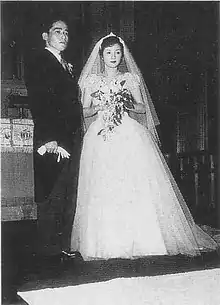Zenzo Matsuyama
Zenzō Matsuyama (松山 善三, Matsuyama Zenzō, 3 April 1925 – 27 August 2016)[1] was a Japanese screenwriter and film director.[2] He was born in Kobe and grew up in Yokohama. After leaving school, he began training to become a doctor but dropped out of medical school to take up a career in films. In 1948 he became an assistant director at Shochiku studios. With the support of Keisuke Kinoshita, he also began writing film scripts. His first filmed script was Kojo no tsuki, based on the song "Kōjō no Tsuki", filmed in 1954. In 1955 he married actress Hideko Takamine. He made his debut as a director with a film called Na mo naku mazushiku utsukushiku in 1961. He continued to work as a scriptwriter for films like Proof of the Man as well as a director. He also wrote the lyrics for a song "Ippon no enpitsu" for Hibari Misora.[3]
Zenzō Matsuyama | |
|---|---|
 The wedding of Matsuyama and Takamine | |
| Born | 3 April 1925 Kobe, Japan |
| Died | 27 August 2016 (aged 91) |
| Nationality | Japanese |
| Occupations |
|
| Spouse | |
Selected filmography
| Title (English) | Release date | Title (Japanese) | Job |
|---|---|---|---|
| The Human Condition | 1959-1961 | 人間の條件 | Scriptwriter |
| Na mo Naku Mazushiku Utsukushiku | 1961 | 名もなく貧しく美しく | Scriptwriter, director |
| Sanga Ari | 1962 | 山河あり | Scriptwriter, director |
| Burari Bura-bura Monogatari | 1962 | ぶらりぶらぶら物語 | Scriptwriter, director |
| Could I But Live | 1964 | われ一粒の麦なれど | Scriptwriter, director |
| Long Journey into Love | 1973 | — | Scriptwriter |
| The Twilight Years | 1973 | 恍惚の人 | Scriptwriter |
| Proof of the Man | 1978 | 人間の証明 | Scriptwriter |
References
- 映画監督の松山善三さん死去 「名もなく貧しく美しく」 (in Japanese)
- "松山善三". Kotobank (in Japanese). Retrieved 21 March 2012.
- "松山善三 高峰秀子". cinemanouveau. Retrieved 27 December 2020.
External links
- Zenzo Matsuyama at IMDb
- Zenzo Matsuyama at the Japanese Movie Database (in Japanese)